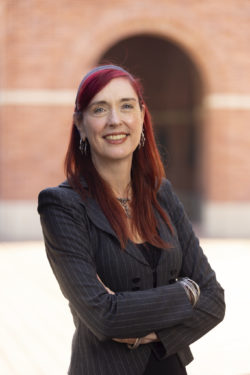Insights from psychology for climate change communications

- Date
- Tuesday 14 March 2023, 14:00 - 15:00
- Location
- Maurice Keyworth SR 1.02 and online
- Online registration
- Register on Zoom
Climate scientists have long been warning that climate change will bring more frequent severe weather events around the world. International organizations such as the IPCC, United Nations Foundation and others face the challenge of communicating about climate scientists' projections with policy makers, practitioners and members of the general public who don't have a background in climate science.
Wändi Bruine de Bruin will discuss insights for climate change communications from her research program on public perceptions of climate change, weather, and energy use. These implications also apply to science communication about other complex topics.
Register now
Speaker
 Wändi Bruine de Bruin is Provost Professor of Public Policy, Psychology, and Behavioral Science at the Sol Price School of Public Policy, and director of the USC Behavioral Science and Well-Being Policy initiative. Her research aims to understand and inform how people make decisions about their personal health, their carbon footprint, and their household finances. She has published more than 130 peer-reviewed publications on these topics. She is an editorial board member for the Journal of Experimental Psychology: Applied, Perspectives on Psychological Science, the Journal of Behavioral Decision Making, Decision, Medical Decision Making, the Journal of Risk Research, and Psychology and Aging. She recently served on the National Academy of Sciences committee on Respiratory Protection for the Public and Workers without Respiratory Protection Programs at their Workplaces. She previously served on expert panels for the National Academy of Sciences on Communicating Science Effectively and for the Council of the Canadian Academies on Health Product Risk Communication. She has been studying risk perceptions and protective behaviors, food insecurity, age differences in mental health, and political polarization during the COVID-19 pandemic and economic crisis. Other recent projects have focused on public understanding of climate change terminology, the role of social contacts in voting and vaccination behavior and using the Lloyd’s Register Foundation World Risk Poll to understand and inform people’s risk perceptions around the world.
Wändi Bruine de Bruin is Provost Professor of Public Policy, Psychology, and Behavioral Science at the Sol Price School of Public Policy, and director of the USC Behavioral Science and Well-Being Policy initiative. Her research aims to understand and inform how people make decisions about their personal health, their carbon footprint, and their household finances. She has published more than 130 peer-reviewed publications on these topics. She is an editorial board member for the Journal of Experimental Psychology: Applied, Perspectives on Psychological Science, the Journal of Behavioral Decision Making, Decision, Medical Decision Making, the Journal of Risk Research, and Psychology and Aging. She recently served on the National Academy of Sciences committee on Respiratory Protection for the Public and Workers without Respiratory Protection Programs at their Workplaces. She previously served on expert panels for the National Academy of Sciences on Communicating Science Effectively and for the Council of the Canadian Academies on Health Product Risk Communication. She has been studying risk perceptions and protective behaviors, food insecurity, age differences in mental health, and political polarization during the COVID-19 pandemic and economic crisis. Other recent projects have focused on public understanding of climate change terminology, the role of social contacts in voting and vaccination behavior and using the Lloyd’s Register Foundation World Risk Poll to understand and inform people’s risk perceptions around the world.
